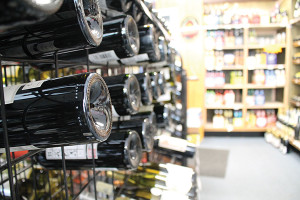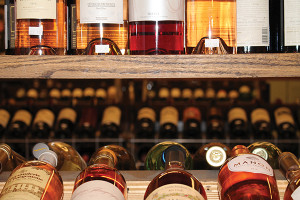
A timeline of a tumultuous week in state liquor law
By Dana Slone
 Total Wine & More, the Bethesda, Maryland-based discount liquor store chain, announced on August 23 that it had filed a lawsuit in the United States District Court in Connecticut challenging the state’s Liquor Control Act Section 30-64 called, “Fair Trade: Schedule of Suggested Prices to be Filed with the Department of Consumer Protection.” The section defines the minimum case price and individual bottle price for “goods sold to retailers” and does not permit retailers to sell “below cost” of that case or bottle acquisition. Beer is not included in the act.
Total Wine & More, the Bethesda, Maryland-based discount liquor store chain, announced on August 23 that it had filed a lawsuit in the United States District Court in Connecticut challenging the state’s Liquor Control Act Section 30-64 called, “Fair Trade: Schedule of Suggested Prices to be Filed with the Department of Consumer Protection.” The section defines the minimum case price and individual bottle price for “goods sold to retailers” and does not permit retailers to sell “below cost” of that case or bottle acquisition. Beer is not included in the act.
The lawsuit claims Connecticut’s mandatory minimum pricing requisite is equivalent to “price-fixing by wholesalers and retailers” and is in violation of the federal Sherman Anti-trust Act. The lawsuit named Jonathan Harris, the state’s consumer protection commissioner, and John Suchy, the director of the liquor control division, which is under the consumer protection department, as defendants.
The lawsuit was timed to coincide with the release of a statewide advertising campaign and marketing flyer from Total Wine & More that announced “Connecticut’s Lowest Prices,” showcasing bottle markdowns. The flyer placed Total Wine & More in violation of the state statute on the books.
Total Wine & More, which bills itself as “America‘s Wine Superstore,” has stores in Manchester, Milford, Norwalk and West Hartford. Its website states that it operates more than 135 “superstores” across 21 states. Its revenues are estimated between $2–$5 billion per year.
On the same day, the Connecticut Package Stores Association (CPSA) filed a formal complaint about the flyer to the Department of Consumer Protection, stating that the “CPSA is aware of the Total Wine & More company actions in defiance of the CT General Statutes regulating the sale of alcohol beverage products by the state’s 1,150 retail package store sellers. The issue of the minimum bottle pricing has been the subject of the last five legislative sessions, initiated by Total Wine or its advocates. The issue to change the bottle price has been resoundingly rejected by legislative leaders and individual legislators.”
Larry Cafero, the executive director of the Wine & Spirits Wholesalers of Connecticut, said in a letter dated August 25 to Consumer Protection Commissioner Jonathan Harris that Total Wine has “publicly, purposefully and blatantly, both in advertisements and in practice, proclaimed that, regardless of when any resolution of their legal challenge to the law may come about, they will defy the law … by selling certain alcoholic beverages below the prices allowed by law.”
Additionally, four state trade associations, the Wine & Spirits Wholesalers of Connecticut, Connecticut Beer Wholesalers Association, Connecticut Package Stores Association and Connecticut Restaurant Association sent the General Assembly a jointly-signed letter on August 29 stating, “It is our position that anyone and everyone has a right to challenge a law and seek its change through the legal system and/or the legislative process. However, it is also our position that, unless and until such law is changed, the current law must be adhered to and enforced.”
In response, Leslie O’Brien, Legislative Program Director for the Department of Consumer Protection (DCP) commented that, “We are investigating potential violations based on the advertisements placed in statewide newspapers … an investigation is underway.”
On August 29, BevMax followed Total Wine & More’s lead, when it too, reportedly began selling products below cost and publicly stated its case to do so. The chain has 11 stores across Connecticut. The DCP began an investigation into the claims.
 On September 1, the DCP announced it had fined Total Wine & More $37,500 for its actions and the retailer agreed to “immediately stop all such advertisements and sales at all four of its Connecticut retail stores.”
On September 1, the DCP announced it had fined Total Wine & More $37,500 for its actions and the retailer agreed to “immediately stop all such advertisements and sales at all four of its Connecticut retail stores.”
The statement continued that the “agreement does not affect a lawsuit brought earlier this month by Total Wine & More challenging Connecticut’s liquor pricing laws. Importantly, however, until those laws are amended by the legislature or declared unlawful through the judicial process, they remain in effect and DCP will continue to vigorously enforce them.”
As of press time, no violations were announced for BevMax related to its actions, although the company was still under investigation, according to O’Brien.
The issue continues to forge deep tensions between the largest of the state’s retail chains and the smaller package stores. Heated debates and hours of documented testimony have occurred in each legislative session since 2012, as various legislation sought to remove elements of the current laws.
Governor Dannel P. Malloy led efforts to change the laws, most recently in 2015 in the form of Senate Bill 14. Opponents’ testimony focused on the state’s excise and sales tax policies as pivotal to regional competitiveness, while proponents focused on minimum pricing laws as the primary factor. The effort ultimately failed when the General Assembly declined further action on the bill. Representatives from Total Wine & More and Distilled Spirits Council testified in favor of the bill, as did DCP Commissioner Harris, now named in the lawsuit.
The lawsuit brought on by Total Wine & More to change the laws, coupled with both its and BevMax’s recent defiance of those current laws, means the topic will remain a visible, but moving, target.



